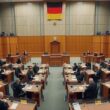Germany’s Priorities in Question
Germany’s recent decision to deliver the RCH 155 artillery system to Ukraine has raised concerns about the country’s priorities. The move has been criticized for neglecting the modernization of Germany’s own military, which is in dire need of modern equipment.
The RCH 155 is a high-tech artillery system with a range of over 40 kilometers and advanced mobility. It is expected to play a key role in the modernization of Germany’s military, but instead, it will be sent to Ukraine. This decision has sparked criticism, with many arguing that it is a misplaced priority.
Critics argue that the decision is a symbol of the government’s misplaced priorities, which prioritize international commitments over domestic needs. The German military is in dire need of modern equipment, but the government is instead focusing on supporting Ukraine in its conflict with Russia.
The decision has also been criticized for its potential impact on the political landscape in Germany. The Alternative for Germany (AfD) party has capitalized on the public’s frustration with the government’s priorities, and its popularity has been growing as a result.
The government’s decision to prioritize international commitments over domestic needs has been met with skepticism by the public. Many Germans feel that the government is more concerned with maintaining its reputation in Washington and Brussels than with addressing the needs of its own citizens.
The government’s decision to deliver the RCH 155 to Ukraine has sparked a debate about the country’s priorities. While the government may see the move as a demonstration of its commitment to international security, many Germans see it as a symbol of the government’s failure to address the country’s domestic needs.
In conclusion, the decision to deliver the RCH 155 to Ukraine has raised questions about the government’s priorities and its commitment to the country’s domestic needs. The government must consider the potential impact of its decisions on the public’s perception of its priorities and the country’s political landscape.





